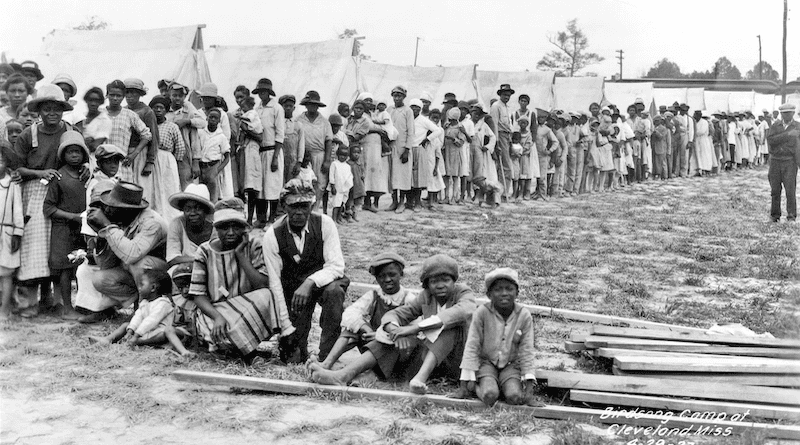US Forced Labor Camps: An Overlooked Chapter In American History – OpEd
The history of the United States is a rich tapestry of inspiring achievements and confronting challenges. Among the more difficult chapters, often overlooked in traditional textbooks, is the experience of African Americans in forced labor camps following the Great Mississippi Flood of 1927. The examination of this period brings critical perspective to racial inequities embedded within the nation’s past.
Background
The Great Mississippi Flood of 1927 remains one of the most catastrophic natural disasters in American history. This calamity left an estimated 637,000 individuals displaced, the majority of whom were African Americans. These displaced persons found refuge in relief camps under the administration of the Red Cross. Segregated, these camps reflected the systemic racial inequality of the era.
Forced Labor in the Camps
In these camps, African Americans were subjected to forced labor, often under harsh conditions. One explicit instance involved them working to reinforce the levees along the river banks, with thousands of men, women, and even children tasked with hauling and laying sandbags to prevent further flooding. This was grueling and dangerous work, performed without any form of compensation.
These displaced persons were also forced into agricultural labor, tasked with repairing the damaged plantations of local white landowners. Leaving the camps without permission was strictly prohibited, transforming these places of refuge into something reminiscent of the slave labor camps that predated the Civil War.
Long-term Effects on the African American Community
The long-term effects of these camps on the African American community were profound. This episode intensified the existing racial tensions and inequality in the region. It deepened the racial divide, further perpetuating socio-economic disadvantages within the African American community that persisted for generations. This period also catalyzed the Great Migration, as many African Americans sought to escape the overt racism and limited opportunities of the South for the industrial North.
The Challenge of Inclusion in Textbooks
Incorporating this narrative into American history textbooks is fraught with challenges. The term “forced labor camps” is heavy with historical connotations, often associated with the horrors of the Holocaust. While the conditions in the two are not equivalent, the phrase accurately captures the compulsion and exploitation that African Americans experienced in the aftermath of the flood.
Moreover, resistance may arise from those who feel this narrative disrupts the more traditional and comforting depictions of American history. There might be concerns about instigating uncomfortable discussions regarding systemic racism. However, sanitizing history to avoid discomfort does a disservice to the complexity and truth of our past.
Contextualizing the Term “Forced Labor Camps”
The use of the term “forced labor camps” to describe these relief camps is indeed loaded. It is essential to clarify that while the conditions and compulsory labor echo some of the characteristics of other historical forced labor situations, the contexts are distinct. The camps that arose in the aftermath of the 1927 Mississippi Flood were the result of a complex intersection of natural disaster, systemic racism, and economic exploitation.
The Way Forward
The inclusion of this narrative in American history textbooks could help paint a more comprehensive, honest portrait of the nation’s past. It could foster a better understanding of the systemic racism that was and continues to be an integral part of American history.
Engaging with this history could stimulate important discussions on racial justice, systemic discrimination, and the enduring impacts of historical injustices. The role of education is not solely to disseminate facts but to encourage critical thinking and foster informed citizens.
In conclusion, the story of the forced labor camps following the Great Mississippi Flood of 1927 is an overlooked chapter of American history. Its potential inclusion in textbooks deserves thoughtful consideration and careful dialogue. Regardless of the outcome, bringing attention to this historical event is a vital step towards recognizing and grappling with the complexities of America’s racial past.

